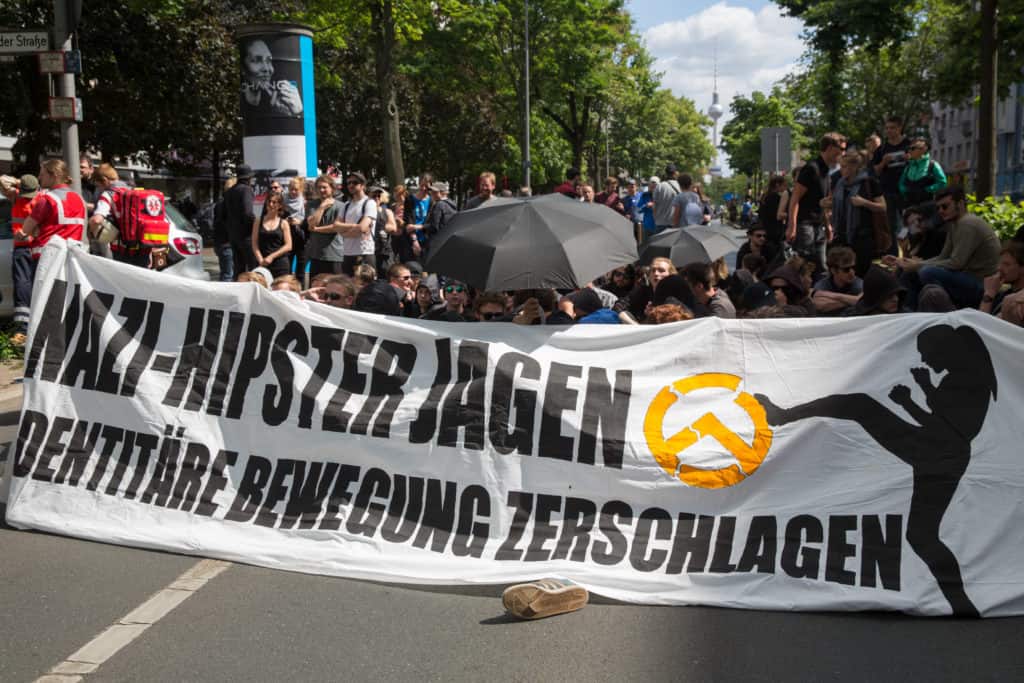Migrant Crisis: ‘Hipster Right’ Group Trying to Stop Rescue Ships
Yalda Hakim, BBC, July 8, 2017

Leftists protest against the ”Identitarian movement.” The banner reads, “Nazi-Hipster Hunters.” Berlin, Germany – 17 Jun 2017. (Credit Image: © Action Press/Rex Shutterstock via ZUMA Press)
They call themselves Generation Identity. Made up of mainly 20-something tech-savvy members, the Identitarian movement has been described as the hipster right.
Fiercely anti-immigration and anti-Muslim, its aim is to stop mass migration to Europe. With headquarters in Austria and France, the group may be small in size, but its message is starting to resonate in Italy – a country where sympathy for migrants is wearing thin.
As the number of people seeking to reach Europe rises again, Italy continues to be the major point of entry for those arriving illegally on boats – particularly in the south.
However, attitudes are hardening and now this new “alt-right” movement says it will do whatever it can to protect Italian identity and culture from outsiders.
Since the start of 2017, more than 80,000 people have made the journey from Libya, across the Mediterranean, to Italian shores, the vast majority landing in Sicily.
Around 2,000 are thought to have died in the attempt, but with almost all other European countries closing their borders, most of the survivors end up staying in Italy.
The vast majority are not refugees fleeing war, but are considered economic migrants and mainly come from sub-Saharan Africa and as far as the Indian sub-continent.
Alarmingly, there’s been a rise in the number of young girls from Nigeria who are forced into prostitution, while boys as young as 16 from Bangladesh are coming via Dubai and Libya looking for work.
“More than 90% of the immigrants coming here by boat are economic refugees,” claims 20-year-old Viviana Randazzo, a newly-recruited member of the Identitarians, although official Italian statistics put the figure at 85%.
“We Italians are also suffering from poverty. Yet we are not given the same treatment – our needs perhaps count even less than theirs.”
Italy is feeling the full burden of these new arrivals and there are now concerns that anti-immigration activists are exploiting the crisis for their own ends, calling for the “remigration” of second and third generation immigrants and the closure of mosques.
The Identitarians point the finger of blame at aid agencies and NGOs (non-governmental organisations) operating close to the Libyan coastline, accusing them of essentially acting as a taxi service to Europe.
“I think these [migrants] are coming to Europe because they know someone will save them,” the movement’s Italy co-ordinator, Lorenzo Fiato, told me in Catania, on Sicily’s eastern coast.
“You can’t solve this problem by helping the human traffickers do their jobs, because they want to transport illegal migrants.”
The NGOs say they operate in co-ordination with the Italian coastguard and argue that they are there to save lives.
“[The people smugglers] don’t need a ‘pull’ factor. They are pushing these people out come what may, and if we’re not there, they will drown. We’re not prepared to let that happen,” says a defiant and frustrated David Alexander, from the charity Save the Children, talking to me in the western port of Trapani.
This summer the Identitarian movement tried to stop a Medecins Sans Frontieres rescue ship from leaving port.
The stunt failed but the group has now managed to raise more than €70,000 (£62,000) in less than three weeks, which it says it will invest in its “Defend Europe” campaign.
Ultimately, this means the group will keep targeting boats run by NGOs trying to rescue the migrants. “We want to defend Europe against mass immigration and multiculturalism,” says Mr Fiato.
“We think that in every city where multiculturalism is present, radical Islam and violence is also present.
“This is a different kind of migration. These are thousands of illegal migrants coming to our shores and flooding into our cities,” he adds.
Italy has recently threatened to shut its ports to foreign boats full of migrants unless other European countries do more to help tackle the crisis. A deal has now been reached between France, Germany and Italy to tighten regulations on NGOs and develop a code of conduct.
This comes amid two ongoing investigations by the Italian authorities, who are trying to determine whether the NGOs are bringing migrants to Italy according to international maritime laws of saving lives, or whether they are merely assisting illegal migrants on their journey.
Ambrogio Cartosio, the chief prosecutor in Trapani, said he felt that the NGOs were somehow encouraging the people smuggling trade.
“It pushes the traffickers to load the migrants on ever more precarious vessels. They can be sure that after a few miles, they will be picked up by the ships,” he told me.
The buying and selling of people is big business and the human trafficking trade continues to become more sophisticated and organised.
It is estimated that this year a quarter of a million migrants will make the perilous journey from Libya to Italy, after the escalation in numbers which typically happens over the summer months. It’s been described as Europe’s graveyard but it’s also now the only route available to them.
“I think what is clear is that people will continue to do this, unless and until there is a safer, legal way to do it,” says Mr Alexander.
“In the meantime, this tragedy will go on unfolding, and we will continue to pick up the pieces, and we will continue to get the blame for something that other people can solve.”
While the crisis continues, so will criticism of the humanitarian effort. As will the message of intolerance.
And a solution? No end in sight.















